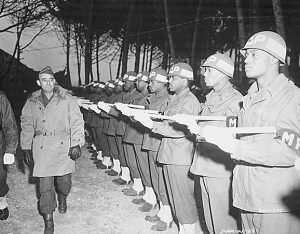Making a Way Out of No Way:
African American Experience in World War II

Lt. Gen. Joseph T. McNarney inspects Honor Guard of 92d Division Military Police.National Archives and Records Administration.
How to register:
We offer two field trip scheduling options:
- Select a field trip from the Museum’s public event schedule
- Request to schedule a field trip time that meets your group’s schedule
Audience:
All audiences. Content appropriate for Grades 6-12.
Goal:
Gain a greater understanding of the accomplishments and challenges of African American Soldiers serving during World War II.
Program Description:
Join us to learn more about the African American Soldiers’ journey for equal rights.
Generations of African Americans have served their country, many serving in segregated units and not always given the respect and honor due to them. Although African Americans fought with distinction in World War II, they returned home to a segregated America. In 1948, President Harry Truman issued Executive Order 9981, which called for equal opportunity for all members of the Armed Forces. The segregated Army became a thing of the past and the segregation of American society began to crumble.
A Museum educator will guide the field trip, exploring the commitment, challenges, and bravery of African American Soldiers serving during World War II and examining artifacts, primary resources, and personal accounts.
Objective:
At the end of the lesson, participants will be able to:
- Note the challenges African American Soldiers faced during World War II.
- Understand the importance of Executive Order 9981 and its impact on American society.
- Identify the Double Victory campaign and its importance to the larger civil rights movement.
- Recognize the service and sacrifice of African American Soldiers during World War II.
Guiding Question:
How did African American military service during World War II contribute to the civil rights movement?
Curriculum Connections:
-
United States History 1865 to Present
-
USII.6 The student will apply history and social science skills to understand the major causes and events of World War II and the effects of America’s role by
- F) identifying the roles and sacrifices of American armed forces, including prisoners of war, women, and segregated units, as well as other notable heroics, including, but not limited to the contributions of the Tuskegee Airmen, the 442nd Regimental Combat Team, Women’s Army Auxiliary Corps, the Women Airforce Service Pilots, the Navajo Code Talkers, and the Bedford boys.
-
USII.6 The student will apply history and social science skills to understand the major causes and events of World War II and the effects of America’s role by
-
Virginia and United States History
-
VUS.14 The student will apply history and social science skills to analyze the United States’ involvement in World War II by
- D) evaluating and explaining the contributions of heroic military units including, but not limited to segregated, minority units, women, and the role of Virginia units in the America war effort.
-
VUS.16 The student will apply history and social science skills to analyze the causes and effects of the Civil Rights Movement by
- A) analyzing the origins of the Civil Rights Movement, the effects of segregation, and efforts to desegregate schools, transportation, and public areas.
-
VUS.14 The student will apply history and social science skills to analyze the United States’ involvement in World War II by
Your message has been submitted.
